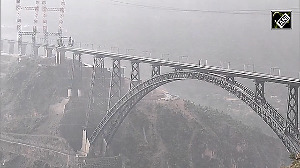'A delay of two years has happened, but stretching it to 2024 is a bit too far.'
'And we do not know about 2024 also.'

'Due to outbreak of COVID-19 pandemic, the conduct of Census 2021, updating of National Population Register and the related field activities have been postponed until further orders,' Minister of State for Home Nityanand Rai told the Lok Sabha on Tuesday, February 7, 2023.
Before Independence, Censuses were periodically conducted from 1865-1941.
After Independence, the first Census was conducted in 1951 under the 1948 Census Act, which interestingly does not bind the Union government to conduct the Census with a specified periodicity.
Though it is a decennial exercise, after the last Census in 2011, India has not had a Census.
This is for the first time in more than 150 years that there is going to be such a gap between two Censuses.
What kind of impact will this have on administration, welfare schemes and other important data?
"There is nothing in the law or the Constitution which says the Census has to be conducted in a 10-year period. Conducting the Census is left to the Executive," K Narayanan Unni, who served as Deputy Registrar General and was a member of the Advisory Committee for Census 2011 and 2021, below, tells Rediff.com's Shobha Warrier in the concluding segment of a two-part interview:
- Part 1 of the interview: 'Census Can't Happen Before 2024'
India of 2023 is very different from the India of 2011. And you may find the data taken in 2011 irrelevant in many areas...
You are right. The changes that have taken place in many areas are quite rapid.
Even the pandemic has created a lot of changes in the form of migration across the country.
We do not know the final impact of those migrations except for some sample survey results.
Most of our sample surveys are done based on the 2011 Census data.
So, your frame for taking samples itself maybe wrong now. This will add uncertainties to the results.
With the time gap increasing, the uncertainties will also go higher and higher.
We have been collecting migration data from 1961 onwards, but I am not very sure how much of it is being used except for rural-urban migration.
But I have not seen inter-state data being used much.
There are research papers, but I am not very sure about the government using the data for planning purposes.
There are also a lot of claims about many government programmes that would be checked by comparing with Census results.
For example, the number of toilets made under the Swachch Bharat Abhiyan.
Only after looking at the Census data, will we know whether the data is synchronous with the claims by the government.
You will not know whether the toilets are used or not without the Census data.
Similarly, the scheme for supplying drinking water, electricity to households...
Reports say that in the case of the Ujwala gas scheme, many people have not refilled the gas cylinder and they have gone back to firewood...
It is quite possible. One of the questions in the Census is, what is the main source of fuel? If a person says, firewood, it will help us looking into the reasons and reformulating the schemes.
There are many such schemes like the food security scheme where the government gives so many kilograms of rice per family.
According to me, per family is not a good way to measure the needs. It should be per head.
This can be done only when you have data on the structure of the family.
The National Food Security Act asks the government to use the figures from the last census to arrive at the number of beneficiaries calculated as 75% of rural and 50% of urban population.
The last census was more than ten years ago and the addition to the population does not get into the calculation.
So, a few crores of people are out of the net.

You were the member of the Advisory Committee for Census 2011 and 2021. How tough is the process of conducting a Census in a large country like India?
Compared to other countries, India has a lot more problems (in conducting the Census).
It is easier for a country like China which is bigger than India, to do the Census.
That's because they have a comparatively uniform administrative structure across the country.
On the other hand, in India, you have the state government, the district administration which are common all over the country.
The next administrative division varies from state to state.
For example, if it's taluks in Kerala, Karnataka, Tamil Nadu, etc, it's police station in West Bengal, and community development blocks in Bihar.
Then the administrative powers of those heading these units also vary.
In Kerala, there are the panchayats and the villages that are independent, but in most of the states, the villages are within the panchayats.
So, in Kerala, you have to collect data from the villages and panchayats.
Sometimes, half the panchayat will be in one village and the other half in another village.
These are very difficult situations and sometimes errors have happened. It's not that errors don't happen.
Then, the languages. You have so many languages in India. Normally we prepare the questionnaire in English, and then carefully translate it into all the Indian languages.
We have to be very careful as everybody should understand everything clearly.
Next is, not only the enumerators but people also should understand the questions.
For example, the list of scheduled castes and scheduled tribes is not common across the country.
The list of SCs and STs is different for each state.
Somebody who is a scheduled caste in one state may not be one in another state.
Do you train the enumerators on all these complexities?
Certainly. In 2020, when the Census was postponed, the training for house listing was completed in many states and the house listing was to start in April. But then in March, the lockdown came.
What is the process after house listing is done?
Once the house listing is done, we will know how many houses are in an area. Based on that, enumeration blocks are created.
In fact, house listing is done based on the enumeration blocks from the previous Census.
After house listing, we rearrange some of the blocks based on the number of houses in one area.
When the house listing is over by September, the next 3-4 months are spent on preparing for the population enumeration like, creating new blocks, training staff, etc.
Usually, the enumeration is in February. Except the snow-bound areas, it is done simultaneously throughout the country between February 9-28.

During the pandemic, countries like China, the UK, US, etc finished their 2021 census...
There are two types of countries; census is mandatory in some countries as per the constitution or law. It's a law in Japan.
It's in the constitution in the US, Nepal, etc.
So, unless you amend the constitution or the law, you cannot postpone the census in such countries.
But in India, there is nothing in the law or the Constitution which says the Census has to be conducted in a 10-year period.
Conducting the census is left to the Executive.
If we look back, we see that even in 1941 when the Second World War was going on, India had conducted the Census.
Yes, in 2020 when the entire country was shut down, it was impossible to conduct the Census. In 2021 also, the situation was fluid.
Probably, we could have prepared in such a way that we could start enumeration in 2023.
Can India afford to delay the Census process to 2024, when it should have happened in 2021?
Technically, we should not have had this kind of a delay. Now, there is no way of doing it earlier.
As things stand, we cannot do it before 2024!
A delay of two years has happened, but stretching it to 2024 is a bit too far. And we do not know about 2024 also.
There is no word from the government that we are actually going to do it in 2024!
Feature Presentation: Aslam Hunani/Rediff.com











 © 2025
© 2025